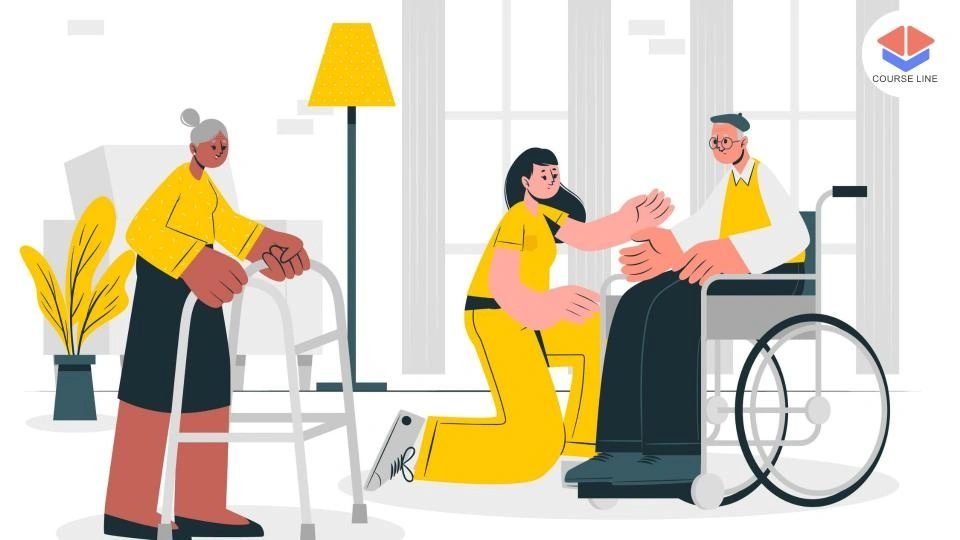Course Features
Price
Study Method
Online | Self-paced
Course Format
Reading Material - PDF, article
Duration
10 hours, 15 minutes
Qualification
No formal qualification
Certificate
At completion
Additional info
Coming soon
- Share
Overview
The "Social Care Level 3 Advanced Diploma" provides a deep dive into the social care sector, exploring the essential aspects of working with vulnerable individuals and promoting their well-being. The course begins by introducing the role of social care workers, the importance of ethical considerations, and the person-centered care approach that is fundamental to supporting individuals with diverse needs. Learners will also gain an understanding of relevant legislation and regulation in social care, setting the foundation for responsible practice.
Communication and interpersonal skills are a significant focus of the course, with training in effective communication techniques, active listening, empathy, and overcoming communication barriers. Building positive relationships with service users is emphasized throughout, enabling students to create environments of trust and support. Health and safety in social care settings are also covered extensively, including risk assessment, infection control, and emergency procedures, ensuring that learners are prepared to maintain safe environments for those they support.
Mental health and well-being are addressed in detail, with lessons on understanding mental health disorders, supporting individuals with mental health challenges, and promoting mental well-being. The course also covers safeguarding vulnerable adults, equipping students with the skills to recognize signs of abuse, report concerns, and collaborate with other agencies in safeguarding efforts.
Other key areas of focus include promoting independence and inclusion, supporting individuals with disabilities, working with children and families, and providing dementia care. Learners will explore person-centered care strategies for individuals with disabilities, empowering service users, and addressing barriers to inclusion. Additionally, the course covers dementia care, including communication techniques and providing meaningful activities for patients. The module on end-of-life care prepares students to deliver palliative care, manage pain, and offer bereavement support to families.
The course concludes with a focus on reflective practice and continuous learning, ensuring that students understand the importance of self-awareness, self-care, and keeping up with best practices in the field. The diploma is designed to equip students with the practical knowledge, skills, and ethical frameworks needed to provide compassionate and effective care across various settings.
Who is this course for?
The "Social Care Level 3 Advanced Diploma" provides a deep dive into the social care sector, exploring the essential aspects of working with vulnerable individuals and promoting their well-being. The course begins by introducing the role of social care workers, the importance of ethical considerations, and the person-centered care approach that is fundamental to supporting individuals with diverse needs. Learners will also gain an understanding of relevant legislation and regulation in social care, setting the foundation for responsible practice.
Communication and interpersonal skills are a significant focus of the course, with training in effective communication techniques, active listening, empathy, and overcoming communication barriers. Building positive relationships with service users is emphasized throughout, enabling students to create environments of trust and support. Health and safety in social care settings are also covered extensively, including risk assessment, infection control, and emergency procedures, ensuring that learners are prepared to maintain safe environments for those they support.
Mental health and well-being are addressed in detail, with lessons on understanding mental health disorders, supporting individuals with mental health challenges, and promoting mental well-being. The course also covers safeguarding vulnerable adults, equipping students with the skills to recognize signs of abuse, report concerns, and collaborate with other agencies in safeguarding efforts.
Other key areas of focus include promoting independence and inclusion, supporting individuals with disabilities, working with children and families, and providing dementia care. Learners will explore person-centered care strategies for individuals with disabilities, empowering service users, and addressing barriers to inclusion. Additionally, the course covers dementia care, including communication techniques and providing meaningful activities for patients. The module on end-of-life care prepares students to deliver palliative care, manage pain, and offer bereavement support to families.
The course concludes with a focus on reflective practice and continuous learning, ensuring that students understand the importance of self-awareness, self-care, and keeping up with best practices in the field. The diploma is designed to equip students with the practical knowledge, skills, and ethical frameworks needed to provide compassionate and effective care across various settings.
Requirements
The "Social Care Level 3 Advanced Diploma" provides a deep dive into the social care sector, exploring the essential aspects of working with vulnerable individuals and promoting their well-being. The course begins by introducing the role of social care workers, the importance of ethical considerations, and the person-centered care approach that is fundamental to supporting individuals with diverse needs. Learners will also gain an understanding of relevant legislation and regulation in social care, setting the foundation for responsible practice.
Communication and interpersonal skills are a significant focus of the course, with training in effective communication techniques, active listening, empathy, and overcoming communication barriers. Building positive relationships with service users is emphasized throughout, enabling students to create environments of trust and support. Health and safety in social care settings are also covered extensively, including risk assessment, infection control, and emergency procedures, ensuring that learners are prepared to maintain safe environments for those they support.
Mental health and well-being are addressed in detail, with lessons on understanding mental health disorders, supporting individuals with mental health challenges, and promoting mental well-being. The course also covers safeguarding vulnerable adults, equipping students with the skills to recognize signs of abuse, report concerns, and collaborate with other agencies in safeguarding efforts.
Other key areas of focus include promoting independence and inclusion, supporting individuals with disabilities, working with children and families, and providing dementia care. Learners will explore person-centered care strategies for individuals with disabilities, empowering service users, and addressing barriers to inclusion. Additionally, the course covers dementia care, including communication techniques and providing meaningful activities for patients. The module on end-of-life care prepares students to deliver palliative care, manage pain, and offer bereavement support to families.
The course concludes with a focus on reflective practice and continuous learning, ensuring that students understand the importance of self-awareness, self-care, and keeping up with best practices in the field. The diploma is designed to equip students with the practical knowledge, skills, and ethical frameworks needed to provide compassionate and effective care across various settings.
Career path
The "Social Care Level 3 Advanced Diploma" provides a deep dive into the social care sector, exploring the essential aspects of working with vulnerable individuals and promoting their well-being. The course begins by introducing the role of social care workers, the importance of ethical considerations, and the person-centered care approach that is fundamental to supporting individuals with diverse needs. Learners will also gain an understanding of relevant legislation and regulation in social care, setting the foundation for responsible practice.
Communication and interpersonal skills are a significant focus of the course, with training in effective communication techniques, active listening, empathy, and overcoming communication barriers. Building positive relationships with service users is emphasized throughout, enabling students to create environments of trust and support. Health and safety in social care settings are also covered extensively, including risk assessment, infection control, and emergency procedures, ensuring that learners are prepared to maintain safe environments for those they support.
Mental health and well-being are addressed in detail, with lessons on understanding mental health disorders, supporting individuals with mental health challenges, and promoting mental well-being. The course also covers safeguarding vulnerable adults, equipping students with the skills to recognize signs of abuse, report concerns, and collaborate with other agencies in safeguarding efforts.
Other key areas of focus include promoting independence and inclusion, supporting individuals with disabilities, working with children and families, and providing dementia care. Learners will explore person-centered care strategies for individuals with disabilities, empowering service users, and addressing barriers to inclusion. Additionally, the course covers dementia care, including communication techniques and providing meaningful activities for patients. The module on end-of-life care prepares students to deliver palliative care, manage pain, and offer bereavement support to families.
The course concludes with a focus on reflective practice and continuous learning, ensuring that students understand the importance of self-awareness, self-care, and keeping up with best practices in the field. The diploma is designed to equip students with the practical knowledge, skills, and ethical frameworks needed to provide compassionate and effective care across various settings.
-
- Understanding the Social Care Sector 00:10:00
- The Role of Social Care Workers 00:10:00
- Ethical Considerations in Social Care 00:10:00
- Person-Centered Care Approach 00:10:00
- Legislation and Regulation in Social Care 00:10:00
-
- Effective Communication Techniques 00:10:00
- Active Listening and Empathy 00:10:00
- Non-Verbal Communication 00:10:00
- Overcoming Communication Barriers 00:10:00
- Building Positive Relationships with Service Users 00:10:00
- Health and Safety Regulations in Social Care Settings 00:10:00
- Risk Assessment and Management 00:10:00
- Infection Control Measures 00:10:00
- Safe Handling of Medications and Equipment 00:10:00
- Emergency Procedures in Social Care 00:10:00
- Recognizing Signs of Abuse and Neglect 00:10:00
- Reporting Procedures for Safeguarding Concerns 00:10:00
- Safeguarding Vulnerable Adults Policy 00:10:00
- Supporting Victims and Providing Advocacy 00:10:00
- Collaborating with Other Agencies in Safeguarding 00:10:00
- Understanding Different Types of Disabilities 00:10:00
- Person-Centered Care for Individuals with Disabilities 00:10:00
- Accessibility and Reasonable Accommodations 00:10:00
- Advocacy and Support Networks for Disabled Individuals 00:10:00
- Promoting Equality and Independence 00:10:00
- Understanding Dementia and its Stages 00:10:00
- Person-Centered Approach to Dementia Care 00:10:00
- Communication Techniques with Dementia Patients 00:10:00
- Providing Meaningful Activities for Dementia Patients 00:10:00
- Supporting Family Members of Dementia Patients 00:10:00
- Importance of Reflective Practice in Social Care 00:10:00
- Self-Awareness and Self-Care for Social Care Workers 00:10:00
- Identifying Areas for Continuous Learning and Development 00:10:00
- Keeping Up with Best Practices and Industry Updates 00:10:00
- Creating a Professional Development Plan 00:10:00
- Premium Certificate 00:15:00

No Reviews found for this course.
Is this certificate recognized?
Yes, our premium certificate and transcript are widely recognized and accepted by embassies worldwide, particularly by the UK embassy. This adds credibility to your qualification and enhances its value for professional and academic purposes.
I am a beginner. Is this course suitable for me?
Yes, this course is designed for learners of all levels, including beginners. The content is structured to provide step-by-step guidance, ensuring that even those with no prior experience can follow along and gain valuable knowledge.
I am a professional. Is this course suitable for me?
Yes, professionals will also benefit from this course. It covers advanced concepts, practical applications, and industry insights that can help enhance existing skills and knowledge. Whether you are looking to refine your expertise or expand your qualifications, this course provides valuable learning.
Does this course have an expiry date?
No, you have lifetime access to the course. Once enrolled, you can revisit the materials at any time as long as the course remains available. Additionally, we regularly update our content to ensure it stays relevant and up to date.
How do I claim my free certificate?
I trust you’re in good health. Your free certificate can be located in the Achievement section. The option to purchase a CPD certificate is available but entirely optional, and you may choose to skip it. Please be aware that it’s crucial to click the “Complete” button to ensure the certificate is generated, as this process is entirely automated.
Does this course have assessments and assignments?
Yes, the course includes both assessments and assignments. Your final marks will be determined by a combination of 20% from assignments and 80% from assessments. These evaluations are designed to test your understanding and ensure you have grasped the key concepts effectively.
Is this course accredited?
We are a recognized course provider with CPD, UKRLP, and AOHT membership. The logos of these accreditation bodies will be featured on your premium certificate and transcript, ensuring credibility and professional recognition.
Will I receive a certificate upon completion?
Yes, you will receive a free digital certificate automatically once you complete the course. If you would like a premium CPD-accredited certificate, either in digital or physical format, you can upgrade for a small fee.
Course Features
Price
Study Method
Online | Self-paced
Course Format
Reading Material - PDF, article
Duration
10 hours, 15 minutes
Qualification
No formal qualification
Certificate
At completion
Additional info
Coming soon
- Share
ADHD Level 3 Advanced Diploma
Course Line243£490.00Original price was: £490.00.£14.99Current price is: £14.99.CIMA: Fundamentals of Business Economics
Course Line237£490.00Original price was: £490.00.£14.99Current price is: £14.99.





